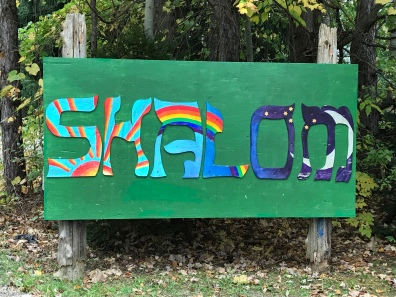
This past winter, Hadassah magazine ran an article titled, “My Daughter the Farmer.” If you have a Jewish mother, you won’t be surprised to learn my mom (lovingly) urged me to read it. When I did, I was drawn down a rabbit hole into the world of Jewish farmers and food educators. I had some idea of the Jewish environmental movement, particularly the concept of eco-kashrut, but the details were fuzzy. The article provided stories of individuals and links to organizations* bridging the gap between ancient Jewish wisdom about connecting with, dwelling in, and tending the earth and contemporary issues around sustainability and access.
As a result, I joined the Jewish Farmer Network on Facebook and began using Jewish hashtags on Instagram in order to connect with a new set of growers and community activists. In August I clicked on a link and applied for a scholarship to attend the Jewish Outdoor, Food, and Environmental Education (JOFEE) Network Gathering. A few weeks ago I was notified that I received the award and made plans to travel to the retreat, in the woods north of Detroit.
I didn’t start farming with Jewish values in mind. I am actively wrestling with the distinction Adrienne Krone, a scholar of religious studies cited in the Hadassah article, makes “between Jewish farmers and farmers who happen to be Jewish.” But when I stop to think about it, being Jewish is a huge part of my identity as an Earthling, and the Jewish values I was raised with are always with me. Growing up kosher made me actively aware of what I eat from an early age. In some ways it seems natural that I became a vegetarian as an adolescent, a cook in my twenties, and a gardener in my thirties.
But through the farm, specifically as it relates to environmental stewardship and social engagement around issues of sustainability and self-reliance, I have come to new questions and new understandings of what it means to mean to be Jewish and new ways to engage Jewish thought and practice. The JOFEE gathering showed me that I had only scratched the surface. I met too many amazing people, was exposed to too many new ideas, and experienced too many ineffable things to describe them all here. This winter I’ll find more time to reflect and write about them. I hope to also – and wrote about this in my scholarship application – find ways to share them with my kehilah (my Jewish community) here in Columbus.
Thursday, I joined other JOFEE participants in Detroit on an urban farm tour. I was excited for this opportunity to check out a scene that I heard referenced many times in conversations with other urban farmers in Columbus. I joined the tour late but got to check out three sites – Oakland Avenue Urban Farm, Coriander Kitchen & Farm, and Keep Growing Detroit (clockwise from left below).
While my time at each site was brief, it was great to get my eyes on new land. It is truly astounding how much of this once densely populated city has been razed and how much vacant greenspace there is. I got a personal tour and some history while driving Keep Growing Detroit’s Eitan Sussman back to his car after the tour ended. Through our conversation I learned that while the Detroit community gardening and farm scene is thriving, it’s still hard for farmers to earn a living doing this work. In addition, Billy, the farm manager at Oakland Park shared that it’s hard to get fresh food into people’s kitchens even when it’s free.
I left Detroit and drove about an hour north to Tamarack Camp in Ortonville. Tamarack is a beautiful 1,500 acre Jewish sleepaway camp and retreat facility. I didn’t realize how much I needed a few days in the woods with spotty cell phone service. The night I arrived, the temperature dropped into the 40s for the first time this fall. Facing the brisk breeze, with not quite the right clothes, added to my sense of being on retreat. It forced me to pay attention to my body and the very air I was breathing in ways I might not have had it been a bit warmer.
The program provided many options for networking over communal prayer, study, and meals. The current political and environmental crises we face were ever-present, particularly last week’s United Nations intergovernmental report on climate change. It was comforting to be in communion with people who not only care deeply about this news, but are working, and encouraging others, to respond to the predictions.
While I can’t say I have figured out what it means to me to be a Jewish farmer, I came home ripe with things to think about and new intentions for of approaching my work on the land and in the community I tend alongside our plants and poultry.
How can I make the earth under my feet the promised land?
What would it mean to create forms of restraint that feel delicious?
What do I love about living on Earth?
How can I feel and express gratitude throughout my days?
How can we increase our grit and resiliency?
How can we connect with the inter-breathing spiring of the world?
While few of our CSA members are Jewish, we can all use some healing and I hope to find ways to do that on and through the farm in the coming years.
NOTE: I’m grateful to all the folks here in CBus who helped hold down the fort and farm while I was gone. This post is dedicated to them and everyone else who continues to support my exploration of the edges and overlaps of Over the Fence and other aspects of my life.
* For others interested in exploring the topic, I suggest this comprehensive listing of Jewish Outdoor Food, Farming, and Environmental Education partners.

